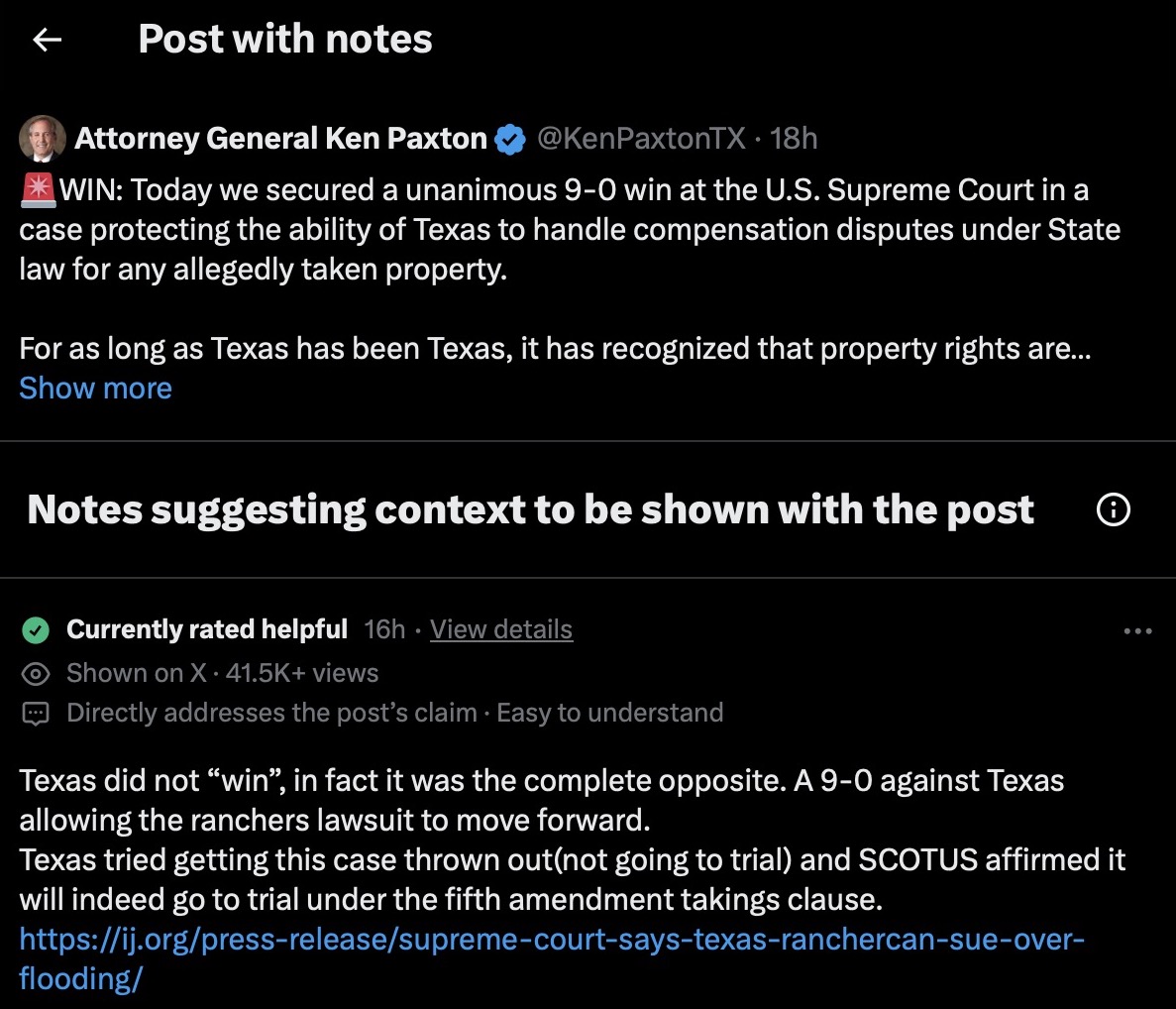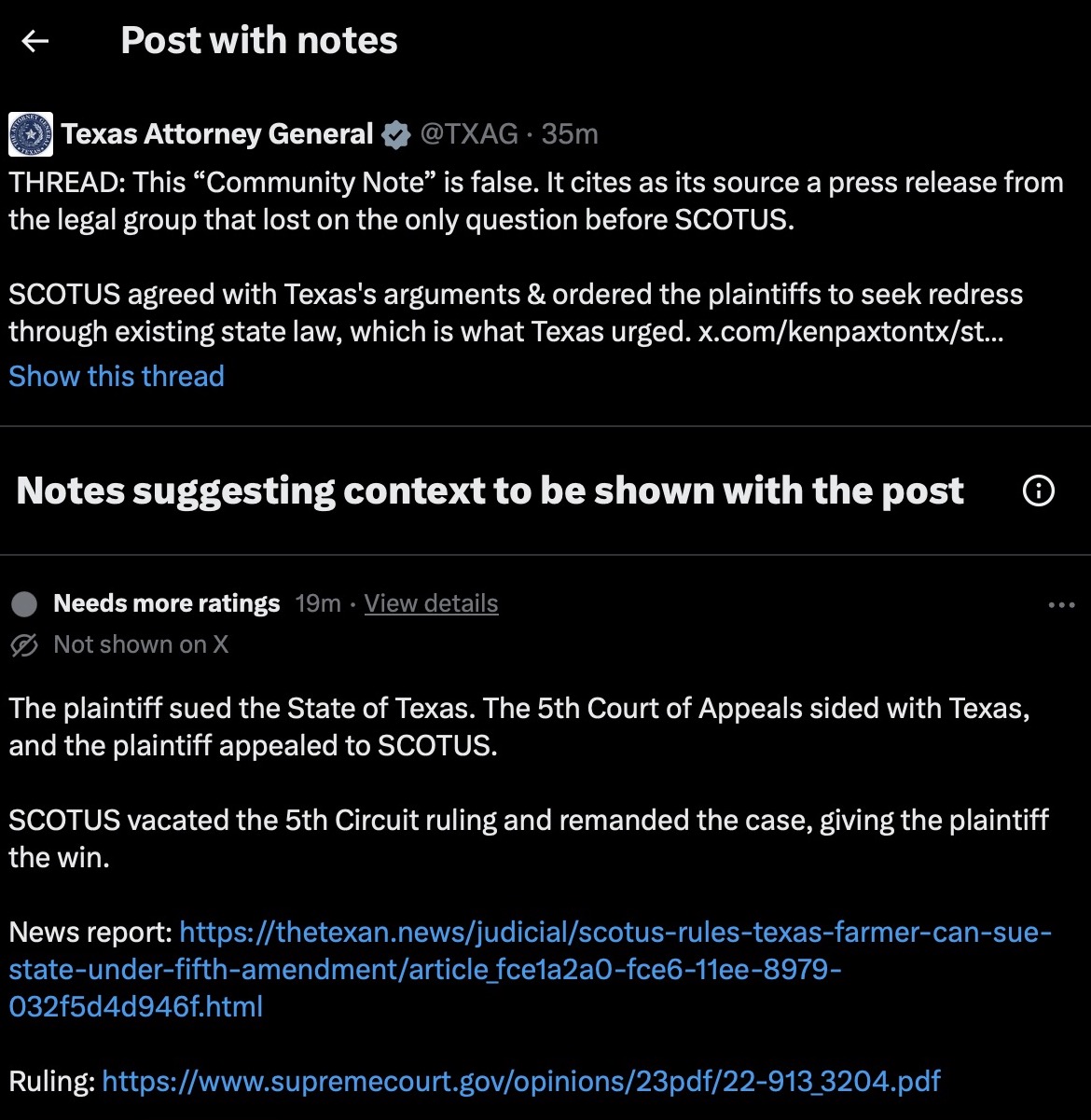‘Ken, You Lost This Case’: Texas AG Mocked for Absurdly Claiming a ‘WIN’ After Supreme Court Rules 9-0 Against Him

AP Photo/Eric Gay, File
Texas Attorney General Ken Paxton (R) has an astounding talent for avoiding consequences — surviving last year’s impeachment effort and weaseling out of a long-running securities fraud criminal case with only restitution and community service as penalties — but even he can’t get away with a flat-out lie about a Supreme Court verdict against his office.
Paxton was suspended from office after being impeached by the Texas House over multiple counts of corruption and bribery. He got his job back after he was acquitted by the Texas Senate, a legislative body where his wife Angela Paxton (R) is a state senator (although the rules barred her from the vote) and that is led by Texas Lt. Gov. Dan Patrick (R), who is supported by the same cabal of wealthy West Texas archconservative donors and who gave Paxton’s campaign a $125,000 “loan” without ever seeming to care if it was paid back.
The embattled attorney general also infamously spearheaded a lawsuit challenging the 2020 election that was so absurd and based on “bogus claims” that not only did the Supreme Court laugh it right out the courthouse doors, he’s facing professional ethical misconduct violations for the attempt.
Paxton got a similarly chilly reception at the nation’s highest court this month, when his office argued against Texas ranchers who were seeking compensation from the state over a Fifth Amendment takings clause issue.
The Institute for Justice (IJ), a nonprofit public interest law firm, represented rancher Richie DeVillier in the litigation, who sued after his ranch was repeatedly flooded by a new median wall built by Texas officials along a highway just to the south of his property, which ended up functioning like a dam during hurricanes and other periods of heavy rain.
The Fifth Amendment to the U.S. Constitution requires that when private property is “taken for public use,” then the government must pay “just compensation” to the property owner. That’s a relatively simple legal question when, for example, a county takes ownership of land via eminent domain to build a highway; it’s more complex when the property owner alleges that the government didn’t seize the legal title to the property but instead did something to damage the value of that property, as DeVillier argued was happening when the new highway median kept causing his property to flood, destroying his crops and drowning his horses and cattle.
DeVillier originally sued in state court, and Texas filed to remove the case to federal court, where it defended against the lawsuit by claiming that the Fifth Amendment didn’t apply to the state because Congress hadn’t passed a law expressly saying it did. Texas initially prevailed at the federal trial court and appellate level. From the IJ’s article about the case:
It was true, Texas admitted, that the Takings Clause requires the government to pay for land it takes (which includes land it makes unusable by, say, recurrent flooding). But Congress has never passed a statute commanding Texas to obey the Fifth Amendment—and, at least according to Texas, that means the state doesn’t have to.
Amazingly, the 5th U.S. Circuit Court of Appeals agreed. In the wake of the Civil War, Congress adopted a law that allows people to sue cities and individuals who violate their rights, but that law doesn’t say anything about lawsuits against states. And that means that, for Texas, paying just compensation is optional. That rule is both dangerous and wrong. True, Congress never passed a law commanding Texas to follow the Constitution, but the Constitution itself commands Texas to follow the Constitution. That is why Richie has teamed up with IJ to ask the United States Supreme Court to clarify that the Constitution isn’t just a good idea—it’s the law. And states have to follow it, even when they don’t want to.
“There is not an asterisk next to the Fifth Amendment that says the government doesn’t have to pay just compensation if it doesn’t want to,” said Institute for Justice Senior Attorney Robert McNamara. “The Supreme Court has repeatedly affirmed Americans’ right to just compensation is an inherent part of the Constitution. It cannot be ignored or circumvented by the government or the courts.”
The IJ appealed the case to the Supreme Court, and that’s where things got even weirder. Paxton’s office spun around and tried to argue that DeVillier was actually able to sue under state law and pursue compensation under the takings clause of the Texas Constitution. During oral arguments, Justice Sonia Sotomayor blasted this tactic as a “bait and switch” and the court unanimously ruled to vacate the judgment of the Fifth Circuit and allow DeVillier’s lawsuit to go forward.
Paxton inexplicably reacted the the Supreme Court ruling by declaring a “WIN” along with a Drudge Report-evoking red siren emoji, in a tweet posted Tuesday evening, claiming Texas had “secured a unanimous 9-0 win at the U.S. Supreme Court” and touting how “as long as Texas has been Texas, it has recognized that property rights are crucial to a free society.”
Paxton’s tweet was swiftly swarmed by people pointing out that the Supreme Court had ruled against what Texas had wanted, allowing DeVillier’s lawsuit to go forward in federal court and pursue compensation under the Fifth Amendment takings clause, and that his office had been fighting against a landowner’s property rights here.
A Community Note dunked on Paxton, pointing out that the ruling was the “complete opposite” of a win.

Screenshot via Twitter.
One of IJ’s attorneys, Patrick Jaicomo, took a smack at Paxton with his own tweet.
“Ken, you lost this case,” was Jaicomo’s blunt comment. “IJ won it.” He included screenshots of Paxton’s brief calling for the Fifth Circuit opinion to be “affirmed” and the Supreme Court opinion ruling that it was to be “vacated.”
The IJ posted a statement on its website from Robert McNamara, the lead counsel on DeVillier’s case, responding to Paxton’s claims.
“The party that gets what he wants is the party that won,” wrote McNamara. “What Texas did is called losing. Only a politician would claim to have won a case he lost.”
Mediaite reached out to McNamara for comment, and he sent the following reply, ridiculing Paxton’s claim he won “weird and embarrassing”:
The simplest way to describe what happened is that in the lower courts Texas argued (successfully!) that Richie wasn’t allowed to sue them under the Fifth Amendment. When the case hit the Supreme Court, Texas (realizing that was an unacceptable argument) changed their tune and said Richie is allowed to sue them under the Fifth Amendment after all. That went poorly for them at oral argument (Justice Sotomayor called their position a “bait and switch”), and yesterday’s opinion said that concession is enough to resolve the case: If Texas now concedes Richie can sue, then Richie can sue.
Since Richie wanted to sue Texas, that means he wins. Since Texas didn’t want Richie to sue them, that means they lose. The attorney general’s claim to the contrary is weird and embarrassing.
Mediaite reached out to Paxton for comment, but did not receive a reply.
UPDATE: About an hour after Mediaite reached out for comment, a spokesperson for Paxton’s office replied, “We just drafted something,” promising “as soon as it’s complete in a few minutes I’ll send it to you.” Over two hours later, Mediaite was sent a link to a new tweet by Paxton complaining that the Community Note was false and insisting that the IJ “lost.”
This new tweet by Paxton also has a pending Community Note fact-checking it.
Here is the proposed Community Note for the above tweet, offering links to the Supreme Court opinion itself and a news report at The Texan, a website founded by former Texas State Senator Konni Burton, a staunch conservative who was “considered a rock star in Republican circles” after she flipped the district formerly held by Wendy Davis (of pink-sneakered abortion filibuster fame) from blue to red.

Screenshot via Twitter.
In the end, the core point McNamara made above stands, that Texas gave up on its previous argument when the case got to SCOTUS and conceded that DeVillier could in fact sue the state, and it was bizarre to claim that as a win: “Since Richie wanted to sue Texas, that means he wins. Since Texas didn’t want Richie to sue them, that means they lose. The attorney general’s claim to the contrary is weird and embarrassing.”
This is an opinion piece. The views expressed in this article are those of just the author.






